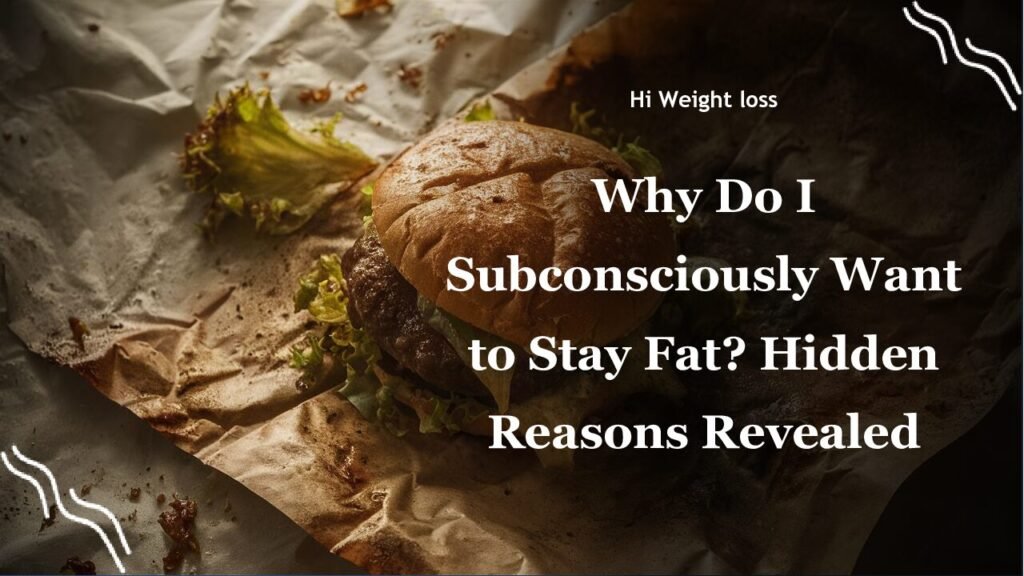“`
Have you ever felt like a hidden part of you is actively working against your weight loss goals, making you wonder, “Why do I subconsciously want to stay fat“? It’s a confusing and frustrating feeling, like a secret sabotage mission being run from inside your own mind. The truth is, this isn’t about a lack of willpower; it’s about a complex interplay of psychological, emotional, and behavioral factors. This article will explore the *subconscious reasons* behind this desire, including how *emotional eating*, negative self-perception, and societal pressures can keep you stuck in unhealthy patterns, and offer strategies for breaking free.
Unpacking the Subconscious: Why You Might Want to Stay Overweight
Emotional Eating: The Comfort Food Trap
Many of us turn to food when we’re stressed, sad, bored, or even just a little uncomfortable. This isn’t just about satisfying hunger; it’s about using food as a coping mechanism. It’s a habit I myself struggled with for years. When I had a tough day at work, I would reach for a bag of chips, seeking solace in the salty crunch. Psychological studies on obesity have found that this kind of emotional eating can trigger overeating and lead to significant weight gain.
Chronic stress can also keep this cycle going. When you’re stressed, your body releases cortisol, a hormone that can increase your appetite for high-calorie foods. It’s like your body is begging for a pick-me-up, and those sugary snacks seem like the perfect solution, even when they’re not.
Negative Body Image and Self-Esteem: The Vicious Cycle
If you struggle with your weight, you might also struggle with a negative view of your body. This can lead to feelings of hopelessness and frustration. I remember a friend, Sarah, who felt so embarrassed by her weight that she avoided the gym, believing she would be judged by others. It’s a cruel trap: The more negative you feel about your body, the less likely you are to engage in activities that could help you change it, creating an unhealthy cycle. Research on body image and obesity confirms that negative self-perceptions can hinder positive lifestyle changes.
It’s like telling yourself, “I’m not good enough, so why bother trying?” This belief can be incredibly powerful, sabotaging your efforts before you even start.
Behavioral Conditioning: Food as Reward
Think about your childhood – were there times when food was used as a reward, or a source of comfort? Maybe you got a treat for doing well in school, or ice cream after a bad day. These experiences create a powerful association in your brain, where food becomes linked with positive emotions. This behavioral conditioning means that even as adults, we unconsciously seek out high-calorie foods when we need to feel better.
The brain’s reward system, particularly the dopamine pathways, gets involved. When we eat something delicious, it releases dopamine, making us feel good. This creates a cycle of seeking out those foods for the pleasure they provide, even when we know we shouldn’t.
Social Stigma and Isolation: The Lonely Path
The societal stigma surrounding obesity is incredibly damaging. It can lead to feelings of shame, social isolation, and low self-esteem. I once knew a neighbor who started avoiding social gatherings because she felt constantly judged for her weight. This isolation creates a vicious cycle. The less support you have, the harder it is to make healthy changes, further reinforcing the desire to stay overweight. The fear of judgment keeps you from seeking help or even being open about your struggles.
It’s a terrible feeling to feel like you don’t belong or that you’re constantly being watched and evaluated based on your appearance.

Hormonal Imbalances: The Body’s Signals Gone Awry
Obesity isn’t just about willpower; it also involves hormonal imbalances. Changes in hormones like leptin, insulin, and cortisol can make it harder to lose weight. Leptin is supposed to tell your brain when you’re full, but in obese individuals, it can become less effective. Insulin helps regulate blood sugar and fat storage and can affect weight loss. These hormonal shifts can make your body more resistant to weight loss and can also increase hunger pangs.
These imbalances can significantly affect appetite regulation, metabolism, and how your body stores fat, making it more challenging to achieve and maintain weight loss. It’s not as simple as ‘eat less and move more’.
Breaking the Cycle: Moving Towards Health
Understanding the complex factors contributing to the *subconscious reasons for obesity and weight gain* is the first step. It’s not just about changing your diet; it’s about addressing the underlying emotional and psychological issues. Here are some strategies to help you move towards a healthier path:
- Mindful Eating: Pay attention to your body’s hunger cues and eat slowly, savoring each bite. Don’t eat in front of the TV or while distracted.
- Emotional Regulation: Find healthy ways to cope with stress and difficult emotions other than food. Try meditation, yoga, or spending time in nature.
- Positive Self-Talk: Challenge negative thoughts about your body and practice self-compassion. Treat yourself with the same kindness you would give a friend.
- Seek Support: Connect with a therapist or support group who understands the complexities of weight and emotional health.
- Physical Activity: Choose activities you enjoy. It doesn’t have to be about pushing yourself to the limit, find something you can stick to consistently.
Remember, you’re not alone in this struggle. Many people experience these challenges, and it’s completely possible to overcome these patterns with the right support and strategies. It’s not about quick fixes but about creating long-term sustainable changes in both mind and body.
| Factor | Description | Impact |
|---|---|---|
| Emotional Eating | Using food to cope with stress, sadness, etc. | Leads to overeating and weight gain |
| Negative Body Image | Negative views about your body | Discourages healthy habits and perpetuates unhealthy behavior |
| Behavioral Conditioning | Associating food with comfort or reward from young age | Leads to subconscious reliance on food |
| Social Stigma | Society’s negative attitude towards obesity | Creates isolation and hinders support |
| Hormonal Imbalances | Altered levels of leptin, insulin, and cortisol | Affects appetite, metabolism and fat storage |
Conclusion
The subconscious desire to stay fat is not about lacking willpower; it’s a complex web of interconnected factors including *emotional eating*, negative self-perception, and the way we’re conditioned to use food. The *psychological reasons for wanting to stay fat* also include the impact of societal pressures. It’s a cycle that can feel impossible to break, but understanding the roots of the problem is key. Like my friend Sarah, who eventually found her way to a body-positive community, and started her journey by focusing on activities she enjoyed, you can take small, but significant steps. By addressing both the physical and emotional components of your relationship with food and your body, you can start to move toward a healthier, more fulfilling life. If this article resonated with you, please consider sharing it with someone you feel might need it, or start by taking a small, mindful action today.
FAQ
Why do I crave unhealthy foods when I’m stressed?
Stress can trigger the release of cortisol, which increases your appetite for high-calorie, sugary foods. These foods can also provide a temporary mood boost, leading to emotional eating.
How can I break free from emotional eating?
Start by identifying your triggers for emotional eating and find alternative ways to cope with stress. Try mindfulness, exercise, or talking to a friend or therapist. Practicing mindful eating is also helpful.
What if I feel too ashamed to go to the gym?
You’re not alone. Start with small, private activities like walking or home workouts. Find a form of movement that you enjoy and that makes you feel good about yourself. Remember that all bodies are worthy of respect and movement.
Is it normal to have conflicting feelings about weight loss?
Yes, it’s very normal. There can be subconscious reasons you might want to stay overweight, but it’s possible to overcome them with self-compassion, self-care and support.
What can I do if I’m struggling with a negative body image?
Begin with self-compassion, challenge negative thoughts and consider talking to a therapist. Building a support system will also help you to better cope with your body image.
“`



